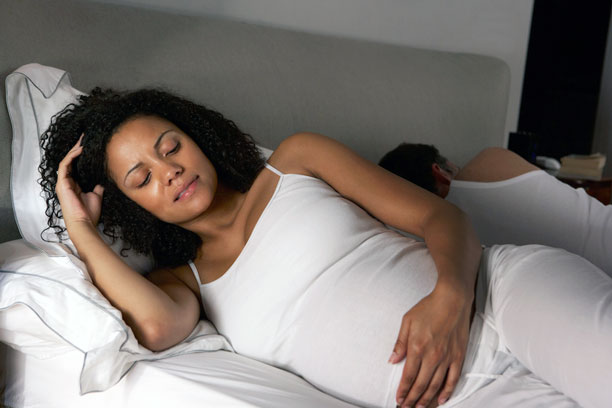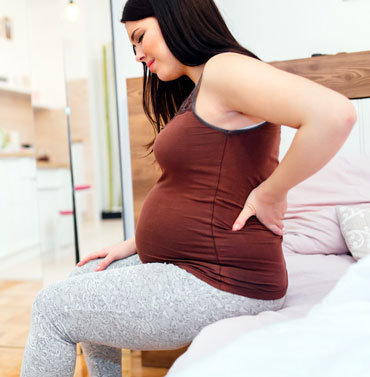Pregnancy is a special time in a woman’s life and many women feel energized and excited by the new experience of carrying a child and becoming a mother. Even so, pregnancy is physically demanding and it comes with its own unique aches and pains. Fortunately, though, most of pregnancy’s symptoms are perfectly normal. However, it is still helpful to understand the discomforts of pregnancy, how they might change from trimester to trimester, and how to better cope with them.
Pregnancy Aches & Pains in the First Trimester
Pregnancy can be exhausting. This is especially true during the first trimester, when the body is experiencing rapid physical changes and supporting critical fetal growth. Fatigue may persist even if you are getting an adequate amount of sleep, but energy levels typically improve around the end of the first trimester or the early part of the second trimester.

Nausea
Nausea is common in the early stages of pregnancy. It is often referred to as “morning sickness,” but it can occur at any time of day and is often triggered by certain smells. For some people, nausea is manageable and may manifest itself as mere queasiness, but for others it can be debilitating. If nausea and vomiting persist or interfere with appropriate weight gain or cause dehydration, a physician consultation will be necessary. In most cases, the severity and frequency of nausea will decrease as the pregnancy progresses.
Abdominal Pain & Cramping
Abdominal pain is another common experience of the first trimester. As the uterus begins to grow, it can cause shooting or cramping pain anywhere in the lower abdomen. This is called “round ligament pain.” It can either resolve itself in the second half of pregnancy, or continue off and on throughout your pregnancy.
It is also not unusual to experience light bleeding or spotting after intercourse or strenuous physical activity, but heavy bleeding or bleeding associated with pain needs to be evaluated promptly by a health care provider.
Pregnancy Aches & Pains in the Second Trimester
 Backaches
Backaches
For a lot of women, the second trimester is the easiest part of pregnancy. Many of the first trimester’s symptoms have subsided, and the baby has not yet grown so large as to be consistently uncomfortable. However, pregnancy-related back pain can be an issue at any time, and it is most often experienced in the second and third trimesters. Backache can affect any part of the upper, mid, or lower back. The discomfort is caused by enlarged breasts, increased weight on the spine, and changes in pelvic support.
Relieving Back Pain
Some back pain can be alleviated by maintaining good posture, propping feet up when sitting for long periods of time, using supportive bras with wide straps, wearing low-heeled shoes, and getting adequate rest. Warm baths or low heat compresses applied to the aggravated area can also help. Regular exercise and appropriate stretching also help. If back pain continues after these measures, talk to your doctor. Women may also consider responsible use of medication and physical therapy.
Severe Back Pain
While backaches are a very common ailment of pregnancy, severe back pain can be a symptom of a more serious condition. Pain that is centered below the rib cage may indicate a kidney infection or stones, or a shooting pain in the buttock or down the back of the leg may be a sign of an issue with the sciatic nerve. Any of these symptoms should be addressed by your obstetrician
Pregnancy Aches & Pains Third Trimester
Fatigue & Pelvic Pressure
In the later stages of pregnancy, it is not uncommon for fatigue to return and many women experience gradually increasing pelvic pressure, or discomfort through the lower pelvis caused by the increased size and weight of the baby. Maternity belts can add much-needed support in the third trimester.
Swelling, Cramps & Tingling
Swelling of the feet and/or legs is also normal and it is not usually a cause for concern if it decreases when the legs are elevated. Similarly, leg and foot cramps or tingling can occur at any time throughout pregnancy. Cramps and swelling can be exacerbated by dehydration.
Shortness of Breath
Another common feature of the third trimester is shortness of breath. This is caused by hormonal changes in your body and by your baby’s increased size putting pressure on your organs. Do not press yourself physically if you are experiencing trouble breathing. In most cases, shortness of breath is harmless and after you give birth your breathing will return to normal. However, sometimes labored breathing is a sign of a more concerning health condition. If you experience heart palpitations, faintness or dizziness, trouble getting a satisfying breath, or a rapid pulse, contact your doctor. A history of asthma or anemia can also exacerbate breathing issues during pregnancy.
Cramping & Braxton-Hicks Contractions
As you near your due date, you might begin to experience mild cramping or tightening across your abdomen. These are known as “Braxton-Hicks” contractions and they are milder and less consistent than labor pains. Warm baths, breathing exercises, and staying hydrated can help lessen the discomfort caused by these irregular cramps.
Take Good Care of Yourself During Pregnancy
The human body has an incredible ability to adapt to the strains and stresses of pregnancy, and while the aches and pains can be unpleasant, it is helpful to understand that they are a normal part of growing a healthy baby. Remember to be patient with your body and take care of yourself, and be deliberate about getting adequate amounts of rest and exercise and always stay hydrated. Maintain a well-balanced diet, and when your body hurts, listen to it. Take good care of yourself and your body will take good care of you and your baby.
If you suspect that the aches and pains you are experiencing during pregnancy are not normal or you need help with pain management, please contact your obstetrician at Kansas City ObGyn to schedule a visit. Contact us online or call us at (913) 948-9636 to schedule your appointment.






